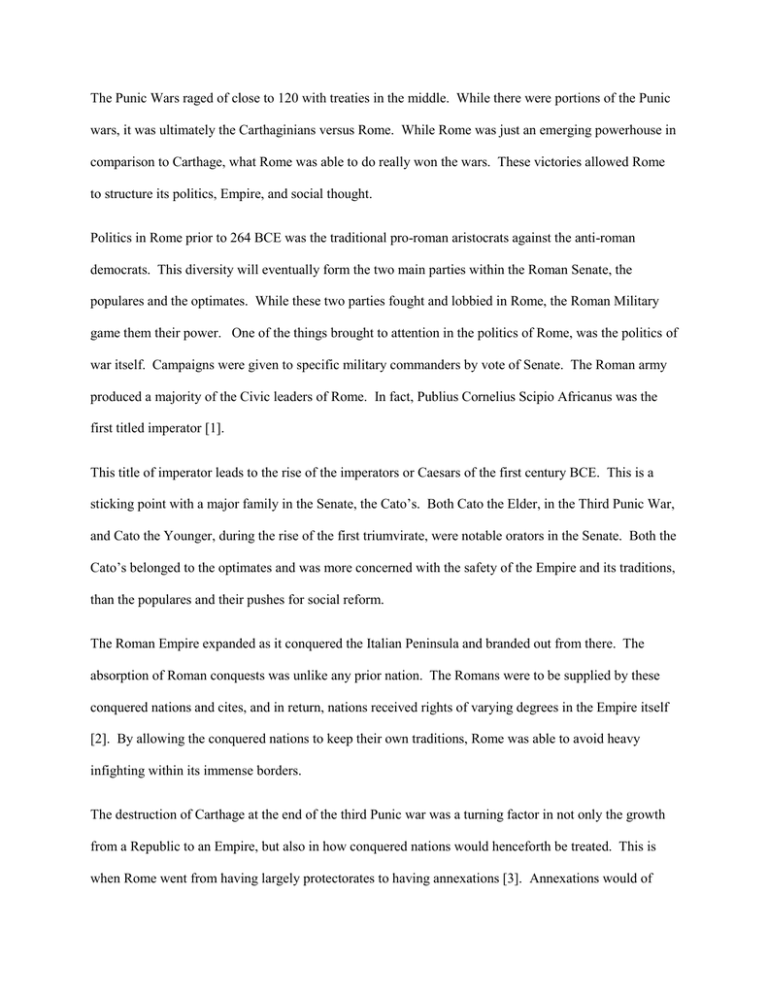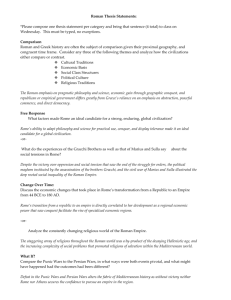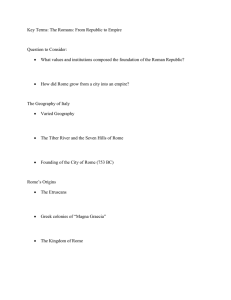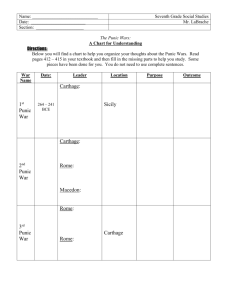Politics in Rome prior to 264 BCE was the traditional pro
advertisement

The Punic Wars raged of close to 120 with treaties in the middle. While there were portions of the Punic wars, it was ultimately the Carthaginians versus Rome. While Rome was just an emerging powerhouse in comparison to Carthage, what Rome was able to do really won the wars. These victories allowed Rome to structure its politics, Empire, and social thought. Politics in Rome prior to 264 BCE was the traditional pro-roman aristocrats against the anti-roman democrats. This diversity will eventually form the two main parties within the Roman Senate, the populares and the optimates. While these two parties fought and lobbied in Rome, the Roman Military game them their power. One of the things brought to attention in the politics of Rome, was the politics of war itself. Campaigns were given to specific military commanders by vote of Senate. The Roman army produced a majority of the Civic leaders of Rome. In fact, Publius Cornelius Scipio Africanus was the first titled imperator [1]. This title of imperator leads to the rise of the imperators or Caesars of the first century BCE. This is a sticking point with a major family in the Senate, the Cato’s. Both Cato the Elder, in the Third Punic War, and Cato the Younger, during the rise of the first triumvirate, were notable orators in the Senate. Both the Cato’s belonged to the optimates and was more concerned with the safety of the Empire and its traditions, than the populares and their pushes for social reform. The Roman Empire expanded as it conquered the Italian Peninsula and branded out from there. The absorption of Roman conquests was unlike any prior nation. The Romans were to be supplied by these conquered nations and cites, and in return, nations received rights of varying degrees in the Empire itself [2]. By allowing the conquered nations to keep their own traditions, Rome was able to avoid heavy infighting within its immense borders. The destruction of Carthage at the end of the third Punic war was a turning factor in not only the growth from a Republic to an Empire, but also in how conquered nations would henceforth be treated. This is when Rome went from having largely protectorates to having annexations [3]. Annexations would of course need to be governed. This was a steeping point into higher Senate ability, as there were certain steps that needed to be met to advance to the next level of Social Service. Social Service within Rome was always to be for the benefit of Rome and not the person. The saying, “Power Corrupts, Absolute Power Corrupts Absolutely”, is highly evident in the new Empire and its social acceptances. The Gracchi brothers started pushing for sever social reforms in 133 BCE, ten years after the end of the Punic Wars. During the 120 years of the Punic Wars, Rome itself was inundated with slaves from across the empire and farmlands going to waste due to lack of a peasant class. Peasants were being recruited into military service heavily during this time leaving their lands to go untended. This allowed for politicians in the Senate to grab up vast tracts of land and change the nation from a cereal production, to grapes and wine. This transition was extreme and caused a rise in urbanization, as farmers were unable to pay to allow for the switch between the two crops. As there were less and less jobs in the country, more move to cities where employment was scarce as well [4]. The Punic Wars covered an important span of development within the time of Rome. The Roman Empire was built from war, and fell to war. The politics of an emerging empire is what truly formed the Roman people, culture, the face of the Punic Wars, and what was to come later. Works Cited Le Glay, Marcel, Jean-Louis Voison, and Yann Le Bohec. A History of Rome: Fourth Edition. Chichester, West Sussex: Wiley-Blackwell, 2009. Rickard, J. "First Punic War, 264-261 BC." History of War. www.historyofwar.org (accessed 08 30, 2012).





